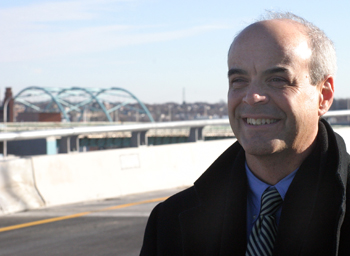As we reported yesterday, the buzz around a two year transportation bill seems to be growing, and there are sound reasons to set our sights on a shorter-term bill, despite the obvious pitfalls.

Pro:
- Preserve higher yearly funding levels
- Start fresh on a longer-term bill in 2013 under a new administration or Obama’s second term, either of which might be more open to talking about raising new revenue
- The economy will likely have further rebounded by 2013, making a gas tax hike less politically dangerous to support
Con:
- John Mica will beat the crap out of you
- Less ability to plan long-term
- Deficit-hawk Republicans unwilling to adequately invest in infrastructure may control both houses of Congress in 2013
I spoke this morning to Michael Lewis, the Director of the Rhode Island DOT. He said he sees both sides. He said obviously, a longer-term bill would be ideal, because it allows states to plan larger projects and manage their finances.
All states have been struggling in recent years because of this continuing resolution. We haven’t been able to plan longer, multi-year projects because we really don’t know how much money we’re getting. That being said, a longer-term bill with less money to the states is a real problem for the states. It’s a real problem for the country. Congress has a real dilemma. If they’re not going to increase the revenues into the Highway Trust Fund, maybe we’re better off at a shorter-term bill that has level funding as opposed to locking in a long-term bill with lower funding.
Brian Searles, secretary of the Vermont DOT, had a similar message. A six-year bill is far better, he told me, and he's still hoping that President Obama's vision for a robust investment package will set the tone for the conversation. But if that doesn't happen? "Oh sure," he said, "if it was a much smaller bill than what president Obama has talked about up to this point then clearly we’d want a bill that was shorter in duration."
States have had a unified message to Congress: we want a long-term bill. And until now, that’s generally been understood to mean a six-year bill. AASHTO is on record as supporting a “multi-year” bill, but it won’t specify how many years is “multi.”
But there is growing buzz about the two-year option. Lewis, who chairs the AASHTO subcommittee on construction, and Searles both say it will be a topic of much discussion at AASHTO’s spring meetings.
Lewis said Rhode Island gets $220 million a year from the Highway Trust Fund for highway and bridge construction, which they currently match with borrowed money. A 20 percent reduction in the total bill could mean their annual take is $176 million – this for a state that already suffers from underinvestment, according to a blue ribbon panel’s 2008 report that found that in order to maintain a state of good repair, the state would need to spend about $640 million a year.
With the reality of a smaller bill sinking in, it makes sense that stakeholders – who almost unanimously told House and Senate panels that they need a far higher level of investment and increased revenues – would look to a two-year bill that doesn’t cut quite as deep.
There is another hazard to coming out in support of a two-year bill, however. Perhaps Mica was kidding when he threatened to “beat the crap” out of anyone proposing a shorter-term bill, but either way, he’s not a man whose bad side anyone wants to get on right now. The first and most important thing that needs to happen to get any transportation bill passed is to get it through the House. If he’s adamantly in favor of a six-year bill, no one serious about getting a bill passed wants to cross him by talking about a two-year bill.
Once a bill gets through the House, however, the Senate can go its own way, hoping to work out the “details” in conference. But does Sen. Baucus have EPW Committee Chair Barbara Boxer’s ear on this whole two-year business? Last I heard, she’s still talking six.





